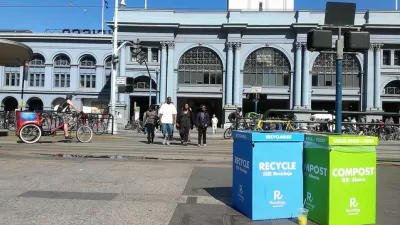Air travel is a notoriously wasteful mode. But one airport is taking huge leaps towards sustainability. Julie Rose reports on Charlotte Douglas International's comprehensive recycling and composting program.
Airports generate a lot of waste. Everything is disposable, clothes are scrapped to meet weight requirements, travelers eat on the run and discard half their food. But in North Carolina, at one of the busiest airports in the U.S., they are serious about recycling, reducing and reusing. Everyday twenty-five tons of trash cascade onto a conveyor belt where it is hand-sorted by a dozen employees. Recyclables are bundled and sold. Discarded clothing is laundered and donated. Food waste is composted on site with the help of a couple (million) critters. All the organic matter is transferred into a series of 50-foot long beds where 1.9 million worms get to work producing fertilizer for airport landscaping.
In four short months, the Charlotte airport has reduced the amount of trash going to the landfill by 70%. Turning trash into worm poop might seem like funny business for an airport, as Rose points out, "Charlotte officials sure did as they debated the $1.2 million it cost to launch the program. But they're not laughing now: The airport expects to be making money off its trash in five years."
FULL STORY: One Airport's Trash Is 2 Million Worms' Treasure

Maui's Vacation Rental Debate Turns Ugly
Verbal attacks, misinformation campaigns and fistfights plague a high-stakes debate to convert thousands of vacation rentals into long-term housing.

Planetizen Federal Action Tracker
A weekly monitor of how Trump’s orders and actions are impacting planners and planning in America.

In Urban Planning, AI Prompting Could be the New Design Thinking
Creativity has long been key to great urban design. What if we see AI as our new creative partner?

Cal Fire Chatbot Fails to Answer Basic Questions
An AI chatbot designed to provide information about wildfires can’t answer questions about evacuation orders, among other problems.

What Happens if Trump Kills Section 8?
The Trump admin aims to slash federal rental aid by nearly half and shift distribution to states. Experts warn this could spike homelessness and destabilize communities nationwide.

Sean Duffy Targets Rainbow Crosswalks in Road Safety Efforts
Despite evidence that colorful crosswalks actually improve intersection safety — and the lack of almost any crosswalks at all on the nation’s most dangerous arterial roads — U.S. Transportation Secretary Duffy is calling on states to remove them.
Urban Design for Planners 1: Software Tools
This six-course series explores essential urban design concepts using open source software and equips planners with the tools they need to participate fully in the urban design process.
Planning for Universal Design
Learn the tools for implementing Universal Design in planning regulations.
Appalachian Highlands Housing Partners
Gallatin County Department of Planning & Community Development
Heyer Gruel & Associates PA
Mpact (founded as Rail~Volution)
City of Camden Redevelopment Agency
City of Astoria
City of Portland
City of Laramie




























